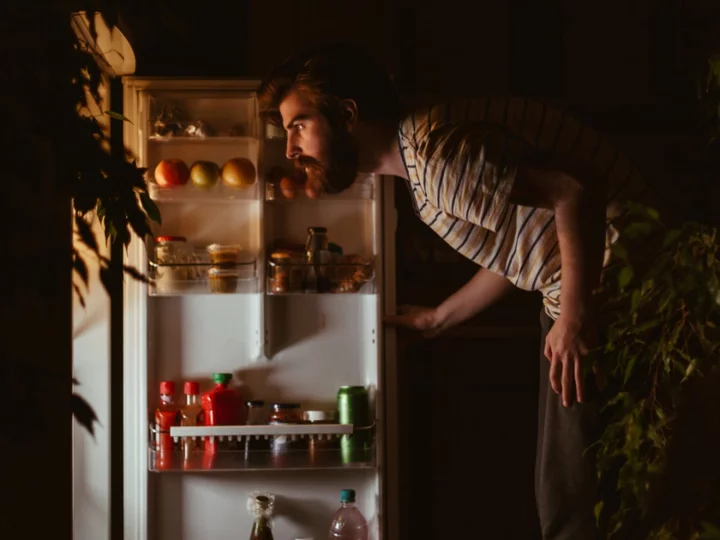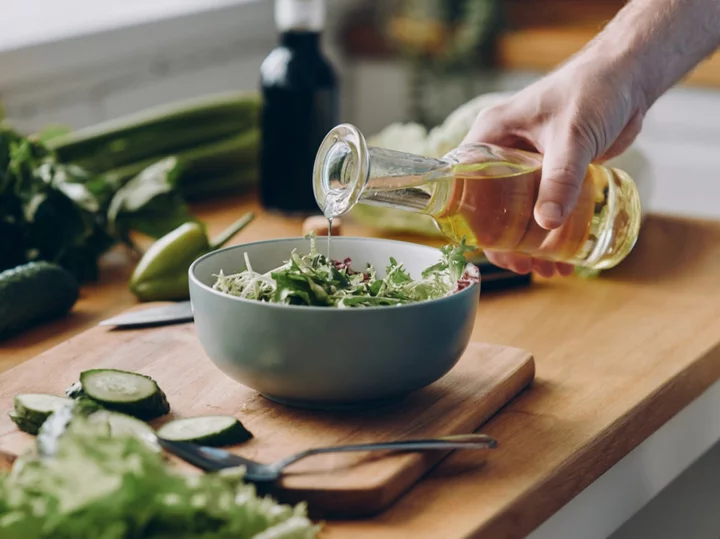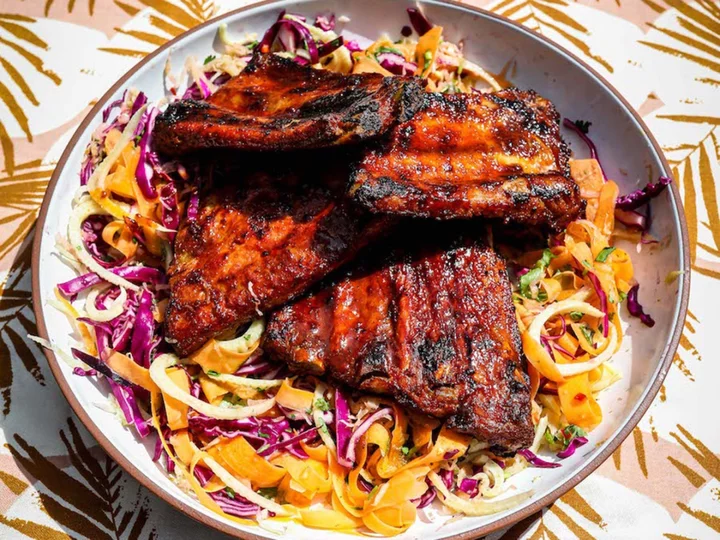
Late night snacking could increase risk of diabetes and heart disease, study says
Eating a snack late at night carries significantly more negative health implications compared to snacking during the day, a new study has found. According to researchers at King’s College London, people who eat most of their snacks in the evening after 9pm saw larger spikes in their blood sugar compared to those snacked earlier in the day. The group who snacked later also had higher concentrations of fat in their blood compared to those who snacked earlier. The researchers studied data from 1,000 people who took part in the Zoe Predict study. The participants kept a food diary and wore blood sugar monitors in order to keep track of the impact of snacking. On average, they ate two snacks a day, with one in three “late evening snackers” eating most of their snacks after 9pm instead of between meals. High blood sugar and fat can lead to diabetes and heart disease, studies have found. People with diabetes are also more likely to have other conditions that raise the risk of heart disease, such as high blood pressure. The Zoe Predict project is a group of in-depth nutritional research studies that aim to reveal how and why people respond differently to the same foods. Kate Bermingham, a postdoctoral fellow at King’s College London and lead author of the study, said: “Surprisingly little has been published on snacking, despite the fact that it accounts for 20 to 25 per cent of energy intake. “Predict followed a large number of people and captured detailed information on their snacking behaviours, allowing this in-depth exploration of snacking on health.” Researchers analysed the relationship between the number of snacks participants ate, the quality of the snacks and the timing with blood fats and insulin levels. Snacking on higher quality foods, which are described as foods that contain significant amounts of nutrients relative to the calories contained, was associated with better bodily responses. The study concluded that the most important factor in determining the body’s response is the quality of snacks, not how often or how much they are consumed. Foods like fruit or vegetables resulted in a better blood fat and insulin response compared to processed foods, such as biscuits and cake. Bermingham added: “Our study showed that the quality of snacking is more important than the quantity or frequency of snacking, thus choosing high quality snacks over the highly processed snacks is likely beneficial. “Timing is also important, with late night snacking being unfavourable for health. This may mean that, universally, snacking late in the evening and interrupting the overnight fasting window is detrimental to health.” The study was presented at a meeting of the American Society for Nutrition. Read More My Taylor Swift exercise class has led me down a luxury fitness rabbit hole Husband fired from family business after wife roleplayed with reborn dolls MrBeast YouTuber Kris Tyson comes out as transgender: ‘I’m excited to authentically be myself’ Scientists share the 8 habits that impact your lifespan the most Cara Delevingne says her journey to sobriety has been worth ‘every second/ Bisexual people ‘experience worse health than other adults’
2023-07-25 18:53

Scientists share the 8 habits that impact your lifespan the most
Scientists have identified eight unhealthy lifestyle choices which, if changed, could see people live more than 20 years longer. Lack of exercise, opioid use and smoking have the biggest negative impact on lifespan and can lead to a 30-45 per cent higher risk of death, according to the study. Stress, binge drinking, poor diet, and poor sleep hygiene were each associated with around a 20 per cent increase in the risk of death. And a lack of positive social relationships was the eighth habit mentioned and is associated with a 5 per cent increased risk of dying. Meanwhile, a separate study suggests incorporating olive oil into your diet could help reduce the risk of dying from dementia. Consuming more than half a tablespoon of olive oil per day is linked to a 28 per cent lower risk of dying from the condition, compared with those who never or rarely eat the oil, researchers say. The findings from both studies were presented at Nutrition 2023, the annual meeting of the American Society for Nutrition being held in Boston, and may include more up-to-date figures than the data initially submitted for the meeting. The research that looked at lifestyle habits used data from medical records and questionnaires collected between 2011-2019 from 719,147 people enrolled in the Veterans Affairs Million Veteran Program. It found that men who have all eight healthy habits - including high physical activity and not smoking - at age 40 would be predicted to live an average of 24 years longer than men with none of these habits, and for women an additional 21 years. Xuan-Mai Nguyen, health science specialist at the Department of Veterans Affairs and rising fourth-year medical student at Carle Illinois College of Medicine, USA, said: “We were really surprised by just how much could be gained with the adoption of one, two, three, or all eight lifestyle factors. “Our research findings suggest that adopting a healthy lifestyle is important for both public health and personal wellness. “The earlier the better, but even if you only make a small change in your 40s, 50s, or 60s, it still is beneficial.” The researchers say their findings, which have not been peer-reviewed, highlight the role of lifestyle factors in contributing to chronic diseases such as type 2 diabetes and heart disease that lead to premature disability and death. In the olive oil study, scientists analysed dietary questionnaires and death records collected from more than 90,000 Americans over three decades, during which 4,749 people died from dementia. It also found that replacing just one teaspoon of margarine and mayonnaise with the equivalent amount of olive oil per day was associated with around an eight to 14 per cent lower risk of dying from dementia. Anne-Julie Tessier, a postdoctoral fellow at the Harvard TH Chan School of Public Health in the USA, said: “Our study reinforces dietary guidelines recommending vegetable oils such as olive oil and suggests that these recommendations not only support heart health but potentially brain health, as well. “Opting for olive oil, a natural product, instead of fats such as margarine and commercial mayonnaise is a safe choice and may reduce the risk of fatal dementia.” Research suggests that people who regularly use olive oil instead of processed or animal fats tend to have healthier diets overall. However, Dr Tessier noted that the relationship between olive oil and the risk of dying from dementia in this study was independent of overall diet quality. She added that the research is observational and does not prove olive oil is the cause of the reduced risk of fatal dementia. However, Professor David Curtis, UCL, said it was difficult to assess whether the research adds much to the understanding of links between diet, health and dementia risk, as it has not been peer-reviewed. He added: “There are many, many differences between people who consume olive oil and those who do not and it is never possible to fully account for all possible confounding factors. “Another point to bear in mind is that about half of dementia is caused by vascular disease so that anything which improved cardiovascular health, such as not smoking, would be expected to reduce dementia risk. “It has been shown that olive oil consumption is associated with better cardiovascular health so one would expect that it would also be associated with lower dementia risk.” Dr Duane Mellor, registered dietitian and senior lecturer at Aston University, said: “The authors claim replacing margarine and mayonnaise with olive oil could reduce risk. “However, many people who did this would also change the food that it is being added to, which could increase vegetable, lentils, beans, peas, seeds and nut intake – all of which are linked to a healthy diet and reduced risk of conditions like dementia. “We also need to remember that it is not just what we eat that helps maintain our brain function, it is how we eat – and remaining sociable around meal times and eating with others can benefit our mental health in the short term and cognitive function as we age.” Read More The bowel cancer symptom George Alagiah wished he’d caught earlier Experts share 8 healthy habits to help you live longer Husband fired from family business after wife roleplayed with reborn dolls Cara Delevingne says her journey to sobriety has been worth ‘every second/ Bisexual people ‘experience worse health than other adults’ The bowel cancer symptom George Alagiah wished he’d caught earlier
2023-07-25 18:50

Sophie Ellis Bextor delights her children with new single
Sophie Ellis Bextor delighted her children with her new single because all five of them and explains why it is "really special" to them all.
2023-07-25 17:49

Rhodes: First flights taking NI tourists from wildfires due later
EasyJet and Jet2 flights carrying passengers from areas affected by wildfires will touch down tonight.
2023-07-25 17:16

Experts share 8 healthy habits to help you live longer
Eight habits that could help people live more than 20 years longer have been identified by researchers. While it’s long been known that certain lifestyle factors can influence lifespan, the American study isolated the eight factors that have the biggest impact – being physically active, being free from opioid addiction, not smoking, managing stress, having a good diet, not regularly binge drinking, having good sleep hygiene, and having positive social relationships. The research was presented at Nutrition 2023, the annual meeting of the American Society for Nutrition, and used data from 719,147 people enrolled in the Veterans Affairs Million Veteran Program. It found low physical activity, opioid use and smoking were associated with around a 30-45 per cent higher risk of death, while stress, binge drinking, poor diet, and poor sleep hygiene were each associated with around a 20 per cent increase, and lack of positive social relationships was linked with a 5% increased risk of dying. Men who had all eight habits at age 40 were predicted to live an average 24 years longer than men with none of the habits, according to the findings, and women with all eight habits in middle age were predicted to live an extra 21 years, compared with women with none of the habits. Xuan-Mai Nguyen, health science specialist at the Department of Veterans Affairs, said: “We were really surprised by just how much could be gained with the adoption of one, two, three, or all eight lifestyle factors. Our research findings suggest that adopting a healthy lifestyle is important for both public health and personal wellness. The earlier the better, but even if you only make a small change in your 40s, 50s, or 60s, it still is beneficial.” The researchers say the findings highlight how lifestyle factors contribute to chronic diseases such as type 2 diabetes and heart disease, which are associated with premature disability and death. How to embrace the eight healthy habits Inspired to give your own lifestyle a boost? “If making these small but mighty adjustments could help you to live for an extra 20 years, maybe it’s time to make those changes,” says life and wellbeing coach, Natalie Trice. She shares the following insights and tips… 1. Do more exercise Regular exercise can help prevent a wide range of major diseases – plus it’s great for keeping stress levels in check. “Going for a walk, having a swim, running with friends, even just a good old dance-off in the kitchen can get your heartbeat up and those feel-good endorphins pumping – so get your trainers on and start moving,” says Trice. 2. Manage stress Trice suggests adopting simple stress-busting practices such as mindfulness meditation, and enjoying hobbies and sports. “These can profoundly impact overall wellbeing, as you bring your stress levels down,” she says. “This isn’t about pretending everything’s great, but rather looking at easy habits you can adopt that will take down the stress, which can lead to anxiety and burnout.” 3. Don’t smoke Quitting smoking is an essential step in improving health and potentially adding years to your life. Trice points out that while some people may think reaching for a cigarette takes the edge off their stress, there are healthier ways to cope. “Maybe going running or taking up yoga could be the release and focus you need, and one that will help you live longer, smell fresher and feel better,” she suggests. “Also, with the cost of cigarettes going up all the time, giving up will free up cash for the things in life that really need to be paid for.”If you are struggling to quit smoking, talk to your GP about options available to help. 4. Don’t binge drink “By cutting down on booze, you’re doing your body and brain a massive favour,” says Trice. “Drinking every night will impact your body and could affect your sleep and work performance. Enjoy life, but if you want to enjoy it for longer, then keep tabs on your drinking.” Official guidelines suggest drinking no more than 14 units of alcohol a week (equivalent to six medium glasses of wine of six pints of beer), spread across at least three days. 5. Eat healthily Generally speaking, a balanced diet that’s rich in fibre, whole grains, fruit and veg and lean protein, with heavily processed and sugary foods kept to a minimum, is linked with better health. “We all know about eating five-a-day but doing this can be tough if you’re busy with family and work. If you can start to do this, you’ll feel better,” says Trice. “Focus on eating regularly and thinking about what you put in your body, so that it works for you, not against you.” 6. Don’t take drugs Recreational drugs can harm health in a number of ways. Trice suggests those affected start by speaking to a trusted friend or their GP, and “look at the support which could not only extend your life, but save it”. 7. Try to get good sleep Trice says: “It’s vital that we look at getting a decent night’s sleep, as this can help you feel so much better. Making sure you have a sleep routine in place can be helpful and can be as easy as having no screens in the bedroom, having a bath or shower before you hit the sack, as well as making sure the temperature is right and you have curtains to keep the light out in the mornings.” 8. Nurture positive social relationshipsTrice observes: “If you’re able to nurture a supportive network of friends, colleagues and family, this can lead to improved mental and emotional wellbeing and a longer life.” Lacking social connections? Look at local volunteering opportunities and community walks and groups. Making friends can take time, but even finding ways to regularly spend time and interact with others can help. Read More My Taylor Swift exercise class has led me down a luxury fitness rabbit hole Husband fired from family business after wife roleplayed with reborn dolls Harry and Meghan Markle accused of snubbing Montecito neighbour Charity boss speaks out over ‘traumatic’ encounter with royal aide Ukraine war’s heaviest fight rages in east - follow live
2023-07-25 14:58

Zero-fuss cooking: BBQ pork ribs and zingy Asian slaw
Sweet and smokey, melt off the bone BBQ pork ribs and a zingy, Asian-style slaw are this week’s match made in heaven. Ideal for family get togethers and al fresco dining, this showstopper summer dish requires zero-fuss cooking. Serve with cold beers and pitta breads to mop up the goodness. BBQ pork ribs and slaw Serves: 4 Ingredients: 800g BBQ pork ribs 1 tbsp hoisin sauce (optional) For the slaw: 2 carrots, peeled into ribbons ¼ red cabbage, shredded ½ fennel bulb, finely sliced ½ red chilli, deseeded and finely diced 1 tbsp root ginger, grated 2 tbsp sauerkraut 2 tbsp hot lemon sauce 2 tbsp chopped coriander Method: To cook the pork ribs, wrap them in tin foil and bake them in the oven at 150C for 1-1.5 hours, or if you have a BBQ, use that! Remove them from the tin foil and increase the temperature of your grill to 200C. Grill for 15-20 mins, basting regularly with the remaining BBQ marinade (and hoisin sauce, if you’re using it). To prepare the slaw, peel your carrots into ribbons and toss them in a large bowl with the shredded red cabbage, finely sliced fennel, and sauerkraut. Add in the grated root ginger, chopped red chilli and coriander. Instead of mayonnaise, try adding hot lemon sauce to your slaw for a zingy, spiced version. Mix well and season to taste, then serve alongside your BBQ ribs. Read More Five dinner ideas from around the world to try this week Hi Barbie! Nine cocktails inspired by the doll’s most iconic outfits The National Portrait Gallery’s new restaurant is fabulous upgrade Three barbecue recipes to try that aren’t burgers The dish that defines me: Alex Outhwaite’s Vietnamese bun cha 3 TikTok-approved recipes for picnic season
2023-07-25 13:48

Rhodes fires: Hundreds back in UK after 'traumatic' Rhodes fires
Britons have been flying into airports including Gatwick, Heathrow, Stansted, Birmingham and Bristol.
2023-07-25 11:27

Spotify raises premium subscription price for millions
For the first time since 2011, Spotify confirms a price hike for about 200m ad-free subscribers.
2023-07-25 05:57

How to watch as New Zealand and Switzerland look to progress at the 2023 Women's World Cup
Women's World Cup co-host New Zealand can potentially secure a place in the tournament's knockout stages with a win against the Philippines in Group A on Tuesday.
2023-07-25 02:28

Miranda Lambert laughs at 'Shoot tequila, not selfies' shirt
Miranda Lambert had a much lighter interaction with a concert goer recently.
2023-07-24 22:51

8 healthy habits to help you live longer – according to a new study
Eight habits that could help people live more than 20 years longer have been identified by researchers. While it’s long been known that certain lifestyle factors can influence lifespan, the American study isolated the eight factors that have the biggest impact – being physically active, being free from opioid addiction, not smoking, managing stress, having a good diet, not regularly binge drinking, having good sleep hygiene, and having positive social relationships. The research was presented at Nutrition 2023, the annual meeting of the American Society for Nutrition, and used data from 719,147 people enrolled in the Veterans Affairs Million Veteran Program. It found low physical activity, opioid use and smoking were associated with around a 30-45% higher risk of death, while stress, binge drinking, poor diet, and poor sleep hygiene were each associated with around a 20% increase, and lack of positive social relationships was linked with a 5% increased risk of dying. Men who had all eight habits at age 40 were predicted to live an average 24 years longer than men with none of the habits, according to the findings, and women with all eight habits in middle age were predicted to live an extra 21 years, compared with women with none of the habits. Xuan-Mai Nguyen, health science specialist at the Department of Veterans Affairs, said: “We were really surprised by just how much could be gained with the adoption of one, two, three, or all eight lifestyle factors. Our research findings suggest that adopting a healthy lifestyle is important for both public health and personal wellness. The earlier the better, but even if you only make a small change in your 40s, 50s, or 60s, it still is beneficial.” The researchers say the findings highlight how lifestyle factors contribute to chronic diseases such as type 2 diabetes and heart disease, which are associated with premature disability and death. How to embrace the eight healthy habits Inspired to give your own lifestyle a boost? “If making these small but mighty adjustments could help you to live for an extra 20 years, maybe it’s time to make those changes,” says life and wellbeing coach, Natalie Trice. She shares the following insights and tips… 1. Do more exerciseRegular exercise can help prevent a wide range of major diseases – plus it’s great for keeping stress levels in check. “Going for a walk, having a swim, running with friends, even just a good old dance-off in the kitchen can get your heartbeat up and those feel-good endorphins pumping – so get your trainers on and start moving,” says Trice. 2. Manage stressTrice suggests adopting simple stress-busting practices such as mindfulness meditation, and enjoying hobbies and sports. “These can profoundly impact overall wellbeing, as you bring your stress levels down,” she says. “This isn’t about pretending everything’s great, but rather looking at easy habits you can adopt that will take down the stress, which can lead to anxiety and burnout.” 3. Don’t smoke Quitting smoking is an essential step in improving health and potentially adding years to your life. Trice points out that while some people may think reaching for a cigarette takes the edge off their stress, there are healthier ways to cope. “Maybe going running or taking up yoga could be the release and focus you need, and one that will help you live longer, smell fresher and feel better,” she suggests. “Also, with the cost of cigarettes going up all the time, giving up will free up cash for the things in life that really need to be paid for.”If you are struggling to quit smoking, talk to your GP about options available to help. 4. Don’t binge drink“By cutting down on booze, you’re doing your body and brain a massive favour,” says Trice. “Drinking every night will impact your body and could affect your sleep and work performance. Enjoy life, but if you want to enjoy it for longer, then keep tabs on your drinking.” Official guidelines suggest drinking no more than 14 units of alcohol a week (equivalent to six medium glasses of wine of six pints of beer), spread across at least three days. 5. Eat healthily Generally speaking, a balanced diet that’s rich in fibre, whole grains, fruit and veg and lean protein, with heavily processed and sugary foods kept to a minimum, is linked with better health. “We all know about eating five-a-day but doing this can be tough if you’re busy with family and work. If you can start to do this, you’ll feel better,” says Trice. “Focus on eating regularly and thinking about what you put in your body, so that it works for you, not against you.” 6. Don’t take drugsRecreational drugs can harm health in a number of ways. Trice suggests those affected start by speaking to a trusted friend or their GP, and “look at the support which could not only extend your life, but save it”. 7. Try to get good sleep Trice says: “It’s vital that we look at getting a decent night’s sleep, as this can help you feel so much better. Making sure you have a sleep routine in place can be helpful and can be as easy as having no screens in the bedroom, having a bath or shower before you hit the sack, as well as making sure the temperature is right and you have curtains to keep the light out in the mornings.” 8. Nurture positive social relationshipsTrice observes: “If you’re able to nurture a supportive network of friends, colleagues and family, this can lead to improved mental and emotional wellbeing and a longer life.” Lacking social connections? Look at local volunteering opportunities and community walks and groups. Making friends can take time, but even finding ways to regularly spend time and interact with others can help. Read More Charity boss speaks out over ‘traumatic’ encounter with royal aide Ukraine war’s heaviest fight rages in east - follow live George Alagiah: What are the signs of bowel cancer? Carol Vorderman says she no longer sunbathes after health scare Carol Vorderman: Why my skin cancer scare means I no longer sunbathe
2023-07-24 21:51

Rhodes fires: Holidaymakers praise locals as wildfires rage on
Wildfires have also broken out on the Greek islands of Corfu and Evia as thousands are evacuated.
2023-07-24 18:54
